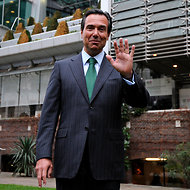Sprint, the No. 3 U.S. mobile service provider, on Wednesday recorded higher-than-expected revenue as customers spent more on wireless services.
Its first-quarter loss narrowed to $643 million, or 21 cents per share, from $863 million, or 29 cents per share, in the year-ago quarter.
Analysts expected a loss of 33 cents per share, according to Thomson Reuters I/B/E/S.
Macquarie analyst Kevin Smithen said Sprint was reducing costs faster than expected from their wind-down of the Nextel network, based on iDen technology.
“They’re beginning to reap the benefits of the iDen decommissioning,” Smithen said.
But subscriber growth in the Sprint-brand network was weaker than Smithen expected due to tough competition from bigger rivals and a new marketing push at smaller rival T-Mobile USA, a Deutsche Telekom unit.
Sprint added 12,000 customers to its network, compared with expectations for additions between 110,000 and 275,000 from four analysts contacted by Reuters.
Including the Nextel network, Sprint lost 560,000 subscribers compared with expectations for a loss of almost 525,000 from five analysts contacted by Reuters.
In comparison, biggest rival Verizon Wireless, a unit of Verizon Communications and Vodafone Group Plc added 677,000 subscribers in the quarter, and No. 2 U.S. mobile provider ATT Inc added 296,000.
“The ATT and Sprint results confirm that T-Mobile USA has been taking share in the last few months,” Smithen said.
Sprint’s revenue rose to $8.79 billion from $8.73 billion. Analysts had expected $8.71 billion.
The company now expects 2013 adjusted operating income before depreciation and amortization at the high end of its previously announced target of between $5.2 billion and $5.5 billion, excluding costs of closing strategic transactions.
Sprint’s board is evaluating a $25.5 billion acquisition offer from No. 2 U.S. satellite TV service Dish, which challenged Sprint’s October agreement to sell 70 percent of itself to SoftBank for $20.1 billion.
Sprint shares were unchanged in premarket trade after closing at $7.10 on the New York Stock Exchange. The stock has risen 14 percent since Dish announced its unsolicited bid on April 12 as investors bet that SoftBank could sweeten its offer.
(Reporting by Sinead Carew; Editing by Jeffrey Benkoe and Gerald E. McCormick)
Article source: http://www.nytimes.com/reuters/2013/04/24/technology/24reuters-sprint-earnings.html?partner=rss&emc=rss


